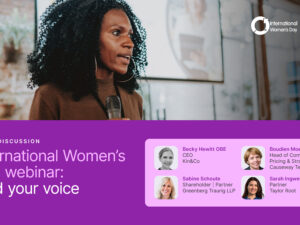Global perspectives series: Edward Bell, Cathay Pacific

Edward Bell is a General Marketing Manager with significant years of marketing experience acquired in Melbourne and across Asia helping brands to find growth paths.
Currently, he has been working with Cathay Pacific since 2017, building the brand strategy with his rich marketing background and international network.
Here, we chatted to him about his views on today’s marketing landscape.
Tell us about your career journey to date?
I’m from a family of artists but went in a different direction of behavioural science as I found it dry and too solitary. So, I started working with agencies and enjoyed the essential qualities of knowledge and creativity.
After I got my master’s degree, I moved from Melbourne to Sydney, as a strategist at Telstra. Then, I got an offer from American Express as a strategist and did a relocation to Hong Kong for 6 months. I consider that a great move and decision because I found my wife there.
SARS hit and I bucked the trend to return and moved to China and took on the head of strategy role for Ogilvy BJ. Then, I got headhunted by Adidas and became the head of marketing, taking on the 2008 BJ Olympics.
I joined WPP and led the strategy on Motorola, then moved to Dell, next Ogilvy Shanghai and worked on mostly FMCG brands. And now, I’m in Cathay Pacific, as the General Marketing Manager, and I’ve been in this role for the last 5 years.
What do you predict will be the key trends impacting marketing in the next 12 months?
The key trends impacting marketing in the next twelve months will lead to a focus on creative use of data and data-driven creativity. The power of story will strike back with a return to the importance of story, emotion and human connection. Localism will also be transformed into globalism, creating economies based on connecting, which is where marketing ties in.
What are the major priorities for your team or division over the coming year and how do you plan to address them?
Firstly, hold the brand high and fight for Cathay and Hong Kong to be the hub of choice for transit passengers. Our next step would be managing via impacting the narrative, through sharing content that showcases the quality of our people and product. Our new and improved products IFE, F&B, Fly Ready service should be repositioned all whilst we drive awareness and adopt our new lifestyle brand ‘Cathay’. Then, we should strive to continue to drive new member acquisition and daily usage of our lifestyle products such as dining, hotels, wellness, cards and payments. Lastly, working with partners to maximise recovery inbound and outbound is a goal to prioritise.
What do you consider the biggest challenges for a CMO?
Marketing is more important than ever. The challenge is that in some companies, they see that some of the marketing tasks should sit elsewhere in the organisation. However, great results come from taking emotional connections that are then turned into personalised journeys powered by data and digital tools. So, the new model CMO needs to bridge the two worlds of soft emotion and hard numbers and bring them together in strategy, execution and measurement. As always, the real challenge will always be faced internally – to showcase competency with data and champion the added benefit of strategic integration.
What is the most effective way you have proved the value of digital marketing?
The easiest way is to use digital marketing techniques that identify the volume of traffic and also from exposure to digital ads. Limitation is the short window of time that doesn’t suit some high involvement categories with longer sales cycles.
Tackling upper funnel is more challenging but vital for the organisation to see the value of marketing. Impacts on the upper funnel can showcase that the campaign has created an impact but not yet rolled into sales enquiries.
It is also good to tackle the upper funnel via econometric modelling which takes time but is very authoritative. You can also or also by creating small market surveys to compare the rate of buying of those who were aware vs not aware of the campaign. Marketers then need to represent the campaign output in terms of sales and future predicted sales to get the attention of the organisation which is mostly tuned in to sales.
What role do you think technology and data will play in the future of marketing?
Technology is necessary but not sufficient for success. We are still in a phase of many companies building up their tech stack and their ability to use it. A good example is how a few companies use 1st party data for improved data-driven marketing.
In the future, technology and data in marketing will become like websites or retail networks. Everyone will have one and their setup will be similar. Marketers need to avoid the ‘wind tunnel effect’ where every brand will have the same insights and same journey sequency.
Companies, led by marketers, will need to start their innovation sequence by asking the question ‘what is the customer’s need? We need to use technology and other ideas to address it, rather than starting with technology and pushing it on customers via ‘email blasting’ as is the current practice.
As such, we will see more use of data as a creative tool – more use of tools to help identify what customers want – what they are searching for, talking about and a reduced reliance of communications blasting machinery.
Take personalisation and NFTs – they are great examples. No one says they want to see ‘irrelevant communications’ but, what they most respond to is interesting messages rather than unengaging messages about relevant topics.
Is there a world where technology and data are not important for the CMO?
Not really, but as I say, it will increasingly fade into the background and become like ‘breathing’. We will use it, but without even thinking about it. We will focus on inspiring and exciting our customers with newer and better brand, product and service engagements.
What advice would you have for other professionals looking to progress their career in marketing?
Walk the talk. Communication skills are extremely important. If you are not a good presenter, storyteller, communicator, you will need to be, and this can be learned.
Talk business. Get comfortable with business terms and language. Marketing spends too much time talking to themselves. For instance, I have noticed that a lot of the surveys that show how important marketing is, are mostly distributed to marketers.
Marketing is more than marcomms. Be clear on the difference between marketing and marketing communications. The profession of marketing incorporates pricing, distribution and product, not just communications.
What do you think the future holds for the position of marketing?
Marketing is a rich career. Be aware that different organisations have different orientations towards marketing. FMCG companies and lifestyle companies are basically entirely marketing companies, and others are more driven by operations or engineering. Both can be rewarding but marketers will not be held up in the same light in Google as they are in Coke or Nike. Also, there are geographical differences. Asian business culture is more driven by sales than marketing. It is changing but most of the big marketing careers in Asia lie with multinationals.
If you’re interested in hearing more about the market, would like to discuss your career or are looking to recruit please get in touch with one of our specialist consultants. We look forward to hearing from you.


